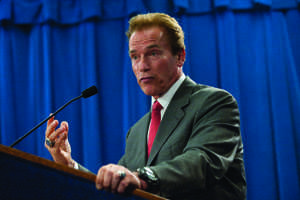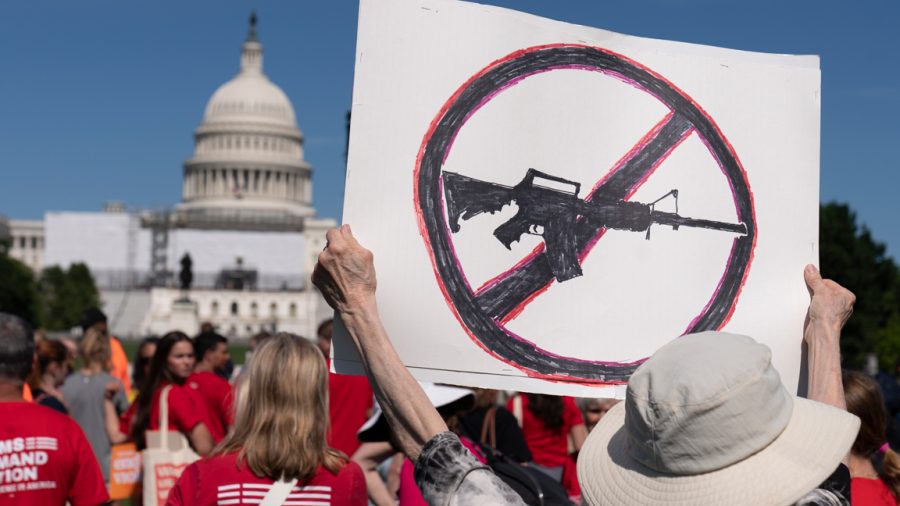 Last Friday California’s lawmakers managed to end a three month struggle to pass a state budget that Governor Arnold Schwarzenegger signed into law last Friday.
Last Friday California’s lawmakers managed to end a three month struggle to pass a state budget that Governor Arnold Schwarzenegger signed into law last Friday.
California faces the problem of an over $19 billion deficit and continued economic downturn that continues to keep California’s economy in a malaise.
The total cost incurred by our newly passed budget is $87.5 billion; an authorization of spending that lawmakers frankly admit relies upon an assumption that the economy will recover in the next fiscal year as well as the prospect of increased federal aid to California.
The major political players in California from the Republicans to the Democrats to organized labor fought long and hard for their interests over the last three months and the result is a compromise that has pleased no party involved.
Democrats and their organized labor allies suffered from cuts to education, state worker pay, and the Governor’s state pension reform policy.
Republicans and their cohorts in business were unable bring home the sweeping tax breaks and alterations in state environmental and green jobs policies.
The compromise brokered to end the budget deadlock rested upon taxes. Republicans were able to take back to their constituents $200 million in tax breaks for businesses; however they were unable to formalize their much lauded no-tax pledge into the budget framework adopted.
It was organized labor that took the brunt of concessions in the latest budget battle. State workers are due to lose $896 million in salaries through a combination of cuts to pension benefits, a new series of furlough days, as well as caps on new hiring.
Education also took major blows, losing $3.1 billion in K-12 and public higher education funding through the suspension of Prop 98’s guarantee for mandated education funding. Functioning as a trade off the Republicans had to give up a proposal for a reduction in corporate tax to the tune of $1.2 billion.
When asked how this reduction would affect public higher education, Cal State East Bay political science professor, Dr. David Baggins said, “I think both parties have recognized that higher education is key to the state’s future. We have hit bottom, and it is time to rebuild. Having said that, the CSU will continue to need to diversify its base, including tuition, money from food service, sale of books, charge for parking, and by finding ways to teach in large format.”
In addition to the agreed upon budget policies deriving from the legislature the Governor added over $963 million in further cuts to the budget via his line-item veto power.
The line-item veto is a power available to California’s Governor that allows for the nullification of specific portions of legislation.
Governor Schwarzenegger used this power to enforce parts of the budget compromise that would have been held up if left in the hands of the divided legislature.
Highlights from the Governor’s enforced cuts include a $18 million cut to drug rehabilitation programs, a $80 million reduction in state provided child care, a general cut of $366 million to the state social safety net, and a $52 million cut to state AIDS/HIV prevention programs.
The cuts are indeed to increase California’s cash-on-hand reserve from $364 million to $1.3 billion. The Governor had indicated the majority of his line-item vetoes will not directly take away funding from the effected programs as federal funding can be diverted by the terms of the budget compromise to those programs.
The reliance on federal funding to make up for reductions could make or break the budget if the state will not receive the $5.3 billion it expects from the federal government. Currently California is due to only receive a federal allocation of $1.3 billion.
Baggins’ points out that California will have to find more reliable ways of revenue generations than assuming that the federal government will grant a bailout.
“There will continue to be need for new public funds. Hopefully that will be in the form of fees and special taxes. Legalization of marijuana would of course both reduce public cost and raise new taxes in a way helpful to the economy. Proposition 21, creating car registration fees for state parks, will take a great public function out of the budget scramble.”
“Passage of the majority vote on budgets will simplify the budget mess greatly. As usual, the state is fundamentally governed through the initiative process. We will live with what we pass,” said Baggins.
California’s Budget
October 14, 2010
More to Discover










